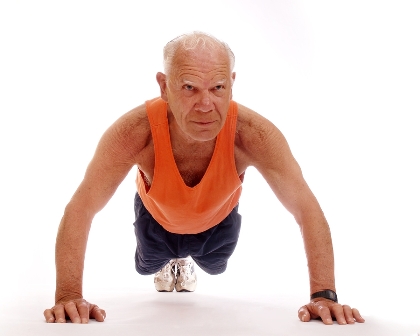Exercise is important for all age groups, particularly for the older adult.When I was a younger, I never worried about my health or quality of life. As I started working with older personal training clients, I started to get an inkling of what it meant to get older and experience a change of priorities. My senior clients, some of whom were in better shape than I was, taught me about the importance of being healthy and taking care of our bodies for the future. Women over 60 who exercise for at least 30 minutes three times per week have the heart, lungs, and muscles of a woman ten years younger. Can you think of any better reason to exercise? In fact, there are other reasons, as well. Women reach a peak bone density at age 35, at which point bone density slowly decreases.
At menopause, bone density begins to drop sharply if hormone replacement therapy is not administered. Lack of exercise, in addition to not eating enough dietary calcium, may be an important promoter of bone loss.Even more important, they taught me that it’s never too late to start exercising and that exercise can make all the difference.
You Can Stop the Clock
Despite all the anti-aging products pushed on us, it’s inevitable that we will get older.
Strength: Sarcopenia is the fancy term scientists have given to describe loss of muscle, strength and quality of tissue often seen in older adults. Some experts have suggested that muscle mass declines about 1% each year from age 30.
Endurance: As we age, we could lose aerobic fitness and experts believe this often contributes to reduced mobility in daily life.
Flexibility: Joints change with age and this can lead to stiffness, decreased range of motion and more injuries
Balance: Each year, hospitals see thousands of older patients for broken hips due to falling. Balance exercises can help you avoid injuries from falls and keep you independent and mobile.
Recommend four types of exercises:
- Strength exercises build older adult muscles and increase your metabolism, which helps to keep your weight and blood sugar in check.
- Balance exercises build leg muscles, and this helps to prevent falls. According to the NIH, U.S. hospitals have 300,000 admissions for broken hips each year, many of them seniors, and falling is often the cause of those fractures.If you are an older adult, balance exercises will help you avoid problems ar you get older.And if you are a senior, balance exercises can help you stay independent by helping you avoid the disabilities that could result from falling.
- Stretching exercises can give you more freedom of movement, which will allow you to be more active during your senior years. Stretching exercises alone will not improve your endurance or strength.
- Endurance exercises are any activity—walking, jogging, swimming, biking, even raking leaves—that increases your heart rate and breathing for an extended period of time. Build up your endurance gradually, starting with as little as 5 minutes of endurance activities at a time.


With this scarcity mentality when it comes to sharing valuable information, it’s a wonder that you can lay it all out unselfishly.
Useful information found in articles can make up for a great ebook. By doing so your energy doesn’t stay buried beneath piles and piles of related content in article directories, rather it continues to pull in prospects and affiliate sales thru wise link placement within the content. Just a concept extend article marketing potential…